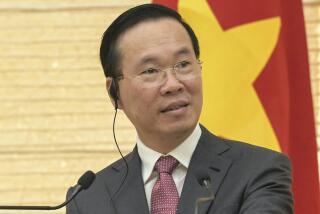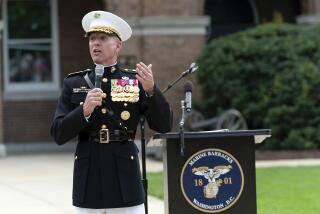Deng Quits China Post; Boost for Successor Seen
- Share via
BEIJING — Senior Chinese leader Deng Xiaoping formally stepped down Wednesday as head of the state Central Military Commission, taking another step to help Communist Party General Secretary Jiang Zemin consolidate power as his designated successor.
Deng’s resignation, formally accepted Wednesday by the National People’s Congress, had been expected since last November, when he stepped down from the more powerful post of head of the Communist Party’s Central Military Commission. When Deng, 85, gave up that post, which is traditionally the most powerful post in China, he was immediately replaced by Jiang, 63.
The two commissions have overlapping membership and are believed to function virtually as a single body, so it was widely assumed that Jiang will also replace Deng on the state commission. Such governmental appointments are handled at annual sessions of the National People’s Congress, China’s nominal legislature, which follows party instructions.
On Monday, Yao Guang, the official spokesman of the National People’s Congress, strongly indicated that Jiang will indeed be confirmed to replace Deng on the state commission.
Despite his retirement from all his formal leadership positions in the party and government, Deng remains the most powerful leader in China, by virtue of his prestige, personal connections and ability to function as ultimate arbiter between competing factions and personalities.
The military, which throughout most of the 1980s faced a declining share of the national budget and reduced influence in politics, has assumed new political importance since last June, when hard-line leaders headed by Deng used troops to crush student-led pro-democracy demonstrations.
Its growing clout was reflected in budget figures presented to the National People’s Congress on Wednesday by Finance Minister Wang Bingqian.
“The expenditure for national defense this year is budgeted at 28.97 billion yuan ($6.15 billion), an increase of 3.824 billion yuan, or 15.2%, over last year’s figure,” Wang said.
Wang said the 1990 budget also contains increases for agriculture, education, science and technology.
Wang described the overall condition of the national budget as “grim,” with the country facing limited revenue growth because of an economic slowdown, but unavoidable needs for increased spending in some areas. He predicted, however, that tight spending controls in most areas would keep the deficit to about $1.89 billion, down from last year’s $2 billion.
More to Read
Sign up for Essential California
The most important California stories and recommendations in your inbox every morning.
You may occasionally receive promotional content from the Los Angeles Times.













